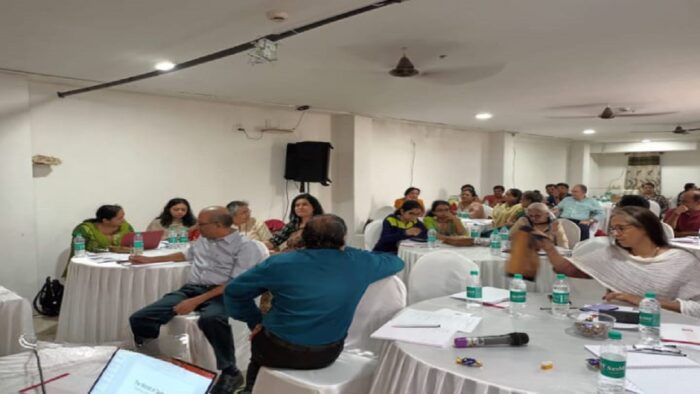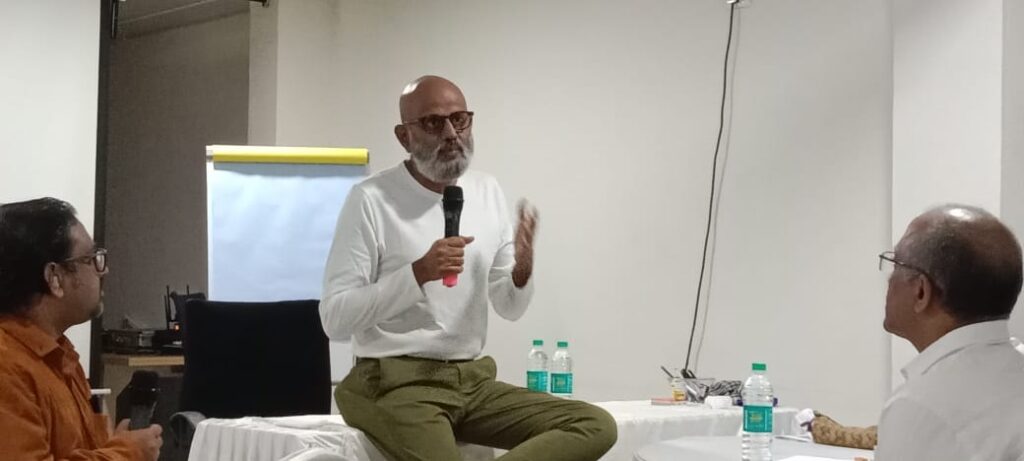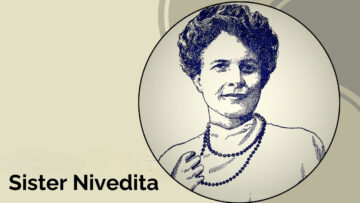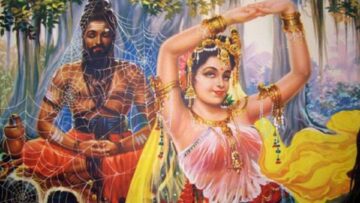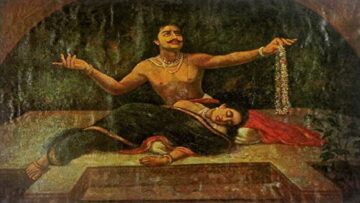The core element of guru-shishya parampara in India is to create an environment of debate and dialogue that enables organic learning. IndicA Today synthesized this environment by giving opportunities to people who are passionate and willing to contribute to Indic Knowledge Systems on various platforms of IndicA. All IndicA contributors are brought together periodically to learn more from the Shastragnas and from each other. I was a part of the shishya community of this workshop and needed handholding to anchor my passion for writing in Indic spaces. The masterclasses were designed to help us writers refine and structure our writing, be it research papers, articles, essays, write-ups, stories, aitihasic or puranic fiction, or book reviews.
The below Subhashita came to my mind while I was reflecting on our workshop:
यस्य नस्ति स्वयं प्रज्ञा शास्त्रं तस्य करोति किम् |
लोचनाभ्याम् विहीनस्य दर्पणः किं करिश्यति ||
Yasya nasti swayam pragna shastram tasya karoti kim |
Lochanaabhyam viheenasya darpanah kim karishyati ||
(How can Shastras come to the rescue, if the person is not aware of his ‘self’? How can the mirror help the one with the loss of vision?)
This element of swayam prajna was captured beautifully in the masterclasses. Swaroop Rawal Ji’s session focused on self-reflection. Sai Swaroopa Ji’s session focused on swadhyaya or self-study and samaya-prajna, time management.
Swaroop Rawal Ji’s class was about reflecting upon one’s thoughts and subsequently on one’s writings. She started the class by probing us to think about some pertinent questions that often echo in our hearts as human beings, ‘What can I do about it?’ ‘What do I want and how does it help?’ As a writer, especially while writing technically, like research papers or thesis papers, how do you maneuver these intimate questions to write? These aspects were handled intelligently and creatively by Swaroop Ji. I must say, it is a masterstroke. This helped declutter our minds and eliminate self-doubt. The idea of staying true to one’s deeper thoughts has never failed and Swaroop Ji’s class caught that element of Prajna very well. All the questions during Q&A or discussions of other co-related topics Led to reflecting on one’s thoughts and values as one writes.
Sai Swaroopa Iyer Ji’s class was about Samaya prajna. She spoke about techniques, tools, and methods an aspiring novelist can engage in while writing a novel alongside giving adequate importance to managing one’s time to write. She stressed time management in various stages of writing as in research, during writing, or post writing, which is editing and reviewing. ‘Budget your day and dedicate time to writing every day and make it a practice,’ she says.
What steers this Prajna into action is Tantra, technique. This was covered in Jayaram Mahadevan Ji’s master class on ‘Tantra Yukti’. Tantra means technique and Yukti means device. This session furnished us with tools and cues to administer various methods in writing. Shastra texts are coherent by nature as they are written for the benefit of society. Thus the content of Tantra Yukti is based entirely on our Shastras. We were spellbound when we learned there is no separate text for Tantra-Yukti like Panini’s Ashtadhyayi for Sanskrit grammar or Chanakya’s Arthashastra. It is Jayaram Ji’s genius idea and sheer brilliance to collate data and information from various shastras and improvise on this concept that can be applied to modern-day writing. Irrespective of what kind of writing is one targeting to write, the core of Tantra Yukti lies in following a method that negates ambiguity, miscommunication, and illogical arguments. Emphasis is on the flow of the write-up to give an intended experience to the reader. Each technique (Tantra) discussed in the class will assist the writer, to discipline his mind to work within the framework of Tantra Yukti and to produce writeups that are coherent, lucid, and intelligent.
Nagaraj Paturi Sir’s class dwelled upon the question I had asked him while having a conversation about my research to write an article, ‘How do you distinguish fact from the interpretation of fact?’ The two-hour session gave amazing insights about what kind of information a writer needs to consume and how can a writer transform this information into profound writing that is not pontifical or dogmatic. The four foundational elements of a well-written piece (Anubandha Chatushtayah) were discussed in depth and were exactly what a writer in me needed. Now, I have a deeper understanding of Vishaya and Prayojana (Topic and purpose).
Yogini Deshpande Ji’s and Shivakumar GV Ji’s sessions about writing series and book reviews opened the floodgates of creative ideas in participants.
My fellow participants are all experts in shastras of their own interests and never shied away from sharing their expertise with the rest. The youngsters in the crowd are old heads on young shoulders. It is applaudable that these young geniuses are already well-versed in various shastras and are applying their Shaastra Gnaana in contemporary concepts like Advaita Vedanta in clinical psychology, Nyaya shastra in law, Yoga in life skills, and innovation of sustainable materials and techniques in temple construction, technology for texts and inscriptions, and so on and so forth.
What makes IndicA Today’s workshop special is that every session is embedded with a dharmic point of view which transforms research and writing into an organic process. The foundation was laid by Swaroop Ji and Jayaram Ji to develop a methodical thought process that begins with ‘Why?’ and takes you through, ‘How?’ This is thoughtful planning of sessions to absolutely benefit the writer to fathom the topic (vishaya) intelligently and produce quality work. Enough emphasis is laid on staying true to one’s inherent values. This also probes story writers, aspiring novelists, and book-reviewers to write in order to have a desired impact on the reader while staying aligned to the Moola Grantha or reference material or books that the writing is based on. Imbibing Shraddha and Nishta in writing practices are the two greatest takeaways of this workshop for me. Our mentors time and again reiterated the importance of practice, discipline, and method in writing.
I am currently reading Panchatantra by Vishnu Sharma. For some reason, my mind was imagining the tantras of Panchatantra and connecting them to the topics discussed in the workshop. I was practicing what I learnt in Swaroop Rawal Ji’s class, reflecting on the topics discussed and connecting it to something I can organically relate to. I could see three of five tantras from Panchatantra unfold in the workshop.
- Mitra samprapti (Develop good friendships)
- Labdha pranasham (Losing what is gained)
- Aparikshita Karakam (Acting without thinking)
Vishnu Sharma advises the readers to engage in the first tantra mentioned here and be aware of and avoid the other two.
Yogini Ji administered Mitra Samprapti every time she was on the mic. One cannot deny the role of good friendships in enriching our lives. It is in good company we grow as individuals from a manasic or dharmic perspective. A verse from Panchatantra says,
मित्रवान् साधयत्य् अर्थान् दुःसाध्यान् अपि वै यतः ।
तस्मान् मित्राणि कुर्वीत समानान्य् एव चात्मनः ॥ २७ ॥
(mitravān sādhayaty arthān duḥsādhyān api vai yataḥ |
tasmān mitrāṇi kurvīta samānāny eva cātmanaḥ || 27 ||)
He, who has true friends by his side, can accomplish the most difficult of tasks that appear impossible to achieve. One should always develop good friendships with like-minded people.
Yogini Ji was very articulative of her friendships with some of the mentors and participants that she cherished for a lifetime personally. She gave us a sneak peek at how those friendships helped her take IndicA Today to shining heights. All of us at the workshop bonded very well and are already sharing write-ups and information in the group and I can’t wait to meet, talk and collaborate with the rest on various projects.
When Nagaraj Ji was talking, Aparikshita-kaarakam was at play. From a writing perspective, lack of vision and social awareness is disastrous, both to the writer and to the topic on hand. Nagaraj Ji explained various techniques to avoid this. His advice to have a vision and know our audience was layered with caution to stay aligned to our texts, truth, and authenticity so that we do not lose the essence of what is built over the years.
Labdha-Pranasham, ‘losing what is gained’, is a tantra that expands on various aspects of life that one has to protect out of self-interest and vigor like health, wealth, relationships and knowledge. The Indic Knowledge System is a victim of constant ignorance, the damage caused for not including it in our pedagogy is irrevocable. ‘Not everything is lost. We need to Preserve, Protect, and Promote’ says Hari Kiran Vadlamani Ji in his valedictory speech. This is in line with what Panchatantra recommends under Labdha-Pranasham. Hari Kiran Ji is a vedantin and an entrepreneur. Therefore his approach to strengthening and reviving Indic Knowledge System is based on its sustenance. His vision and comprehensive action plan is to bring back IKS through various platforms of IndicA that will help shaastra-adhyayana (learning of shaastras) percolate into universities as a branch of specialized studies and sustain on its own through autonomous Gurukulas.
I have personally learned so much through IndicA Today and their various other platforms and IndicA is like Guru to me. My deep gratitude to the organizers and all the mentors for this workshop and your work that is inspiring and encouraging to learn, grow and contribute.
Disclaimer: The opinions expressed in this article belong to the author. Indic Today is neither responsible nor liable for the accuracy, completeness, suitability, or validity of any information in the article.

